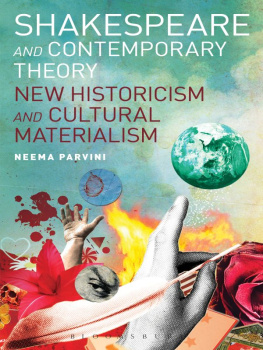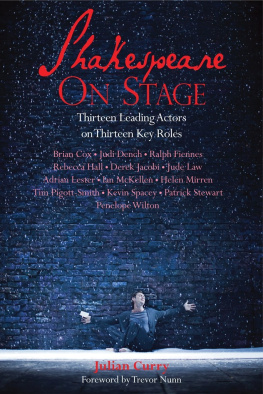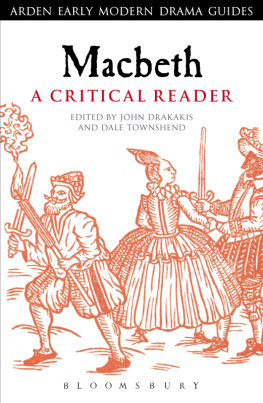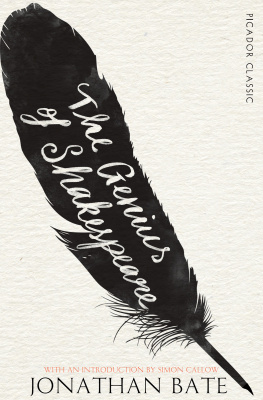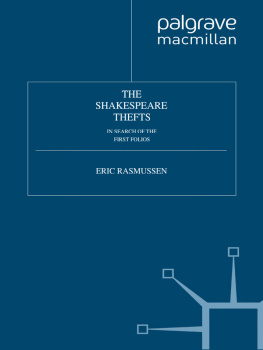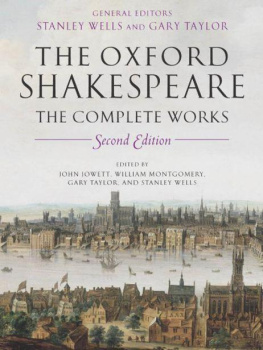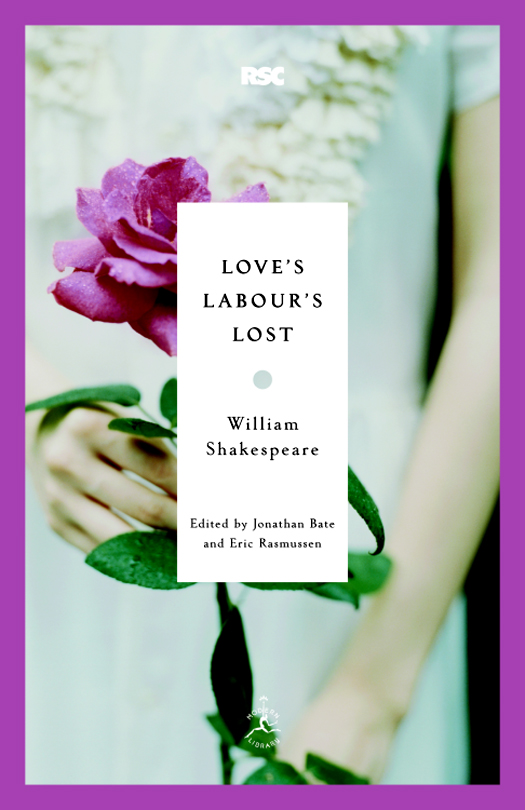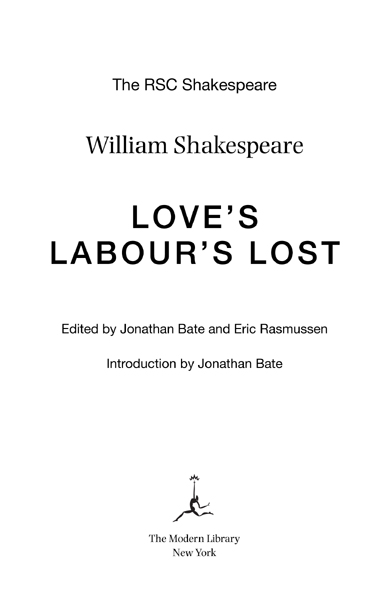2008 Modern Library Paperback Edition Copyright 2008 by The Royal Shakespeare Company All rights reserved. Published in the United States by Modern Library, an imprint of The Random House Publishing Group, a division of Random House, Inc., New York. M ODERN L IBRARY and the T ORCHBEARER Design are registered trademarks of Random House, Inc. Royal Shakespeare Company, R SC , and the R SC logo are trademarks or registered trademarks of The Royal Shakespeare Company. eISBN: 978-1-58836-831-7 www.modernlibrary.com v3.1
The RSC Shakespeare Edited by Jonathan Bate and Eric Rasmussen
Chief Associate Editor: Hlose Snchal
Associate Editors: Trey Jansen, Eleanor Lowe, Lucy Munro, Dee Anna
Phares, Jan Sewell
Loves Labours Lost Textual editing: Eric Rasmussen
Introduction and Shakespeares Career in the Theater: Jonathan Bate
Commentary: Eleanor Lowe and Hlose Snchal
Scene-by-Scene Analysis: Esme Miskimmin
In Performance: Karin Brown (RSC stagings) and
Jan Sewell (overview)
The Directors Cut (interviews by Jonathan Bate and Kevin Wright):
Terry Hands and Liz Shipman
Reflections: Gregory Doran
Editorial Advisory Board Gregory Doran, Chief Associate Artistic Director,
Royal Shakespeare Company
Jim Davis, Professor of Theatre Studies, University of Warwick, UK
Charles Edelman, Senior Lecturer, Edith Cowan University,
Western Australia
Lukas Erne, Professor of Modern English Literature,
Universit de Genve, Switzerland
Maria Evans, Director of Education, Royal Shakespeare Company
Akiko Kusunoki, Tokyo Womans Christian University, Japan
Ron Rosenbaum, author and journalist, New York, USA
James Shapiro, Professor of English and Comparative Literature,
Columbia University, USA
Tiffany Stern, Fellow and Tutor in English, University of Oxford, UK
LOVES
LABOURS LOST
CONTENTS
Loves Labours Lostin Performance:The RSC and BeyondINTRODUCTION
A GREAT FEAST OF LANGUAGES
Loves Labours Lost is a play for Shakespeare connoisseurs. It is a great feast of linguistic sophistication on the theme of the inadequacy of linguistic sophistication.
It is full of poetryand mockery of poetry. Its preposterous academic posturing is either hilarious or incomprehensible, according to the disposition of the listener. Some of its jokes and puns are now so obscure that a modern audience frequently finds itself in the position of Dull, listening in bemusement as the others plan their play: Via, Goodman Dull! says Holofernes, Thou hast spoken no word all this while. To which the simple constable replies, Nor understood none neither, sir. The play was a favorite for the elite audience at courtQueen Elizabeth herself would without question have greatly enjoyed the authority, wit, and hunting skills of the princess. But she would also have taken pleasure in the sweet smoke of rhetoric that pervades the elaborate speechifying of the male courtiers.
And she had the education to appreciate the comedy in the wordy academic humor of Holofernes and Don Armado. The reaction of some members of the general theatergoing publicthe base vulgar, as the play itself calls themmight have been more like that of Dull. It comes as no surprise that in the eighteenth and nineteenth centuries this was Shakespeares least-performed play. Its minimal plot, intellectual rigor, and architectural symmetry make Loves Labours Lost seem to belong to some genre far from the popular theaterEnlightenment opera buffa, perhaps. There are, indeed, remarkable thematic and structural resemblances to Mozart and Da Pontes Cos fan tutte. A Paris production of 1863 actually merged the two works, combining Mozarts music with a text based on Shakespeare.
In the following century, W. H. Auden and his lover collaborated with Vladimir Nabokovs cousin on an operatic version of the play, perhaps inspired by the fictional composer Leverkhn in Thomas Manns novel Doctor Faustus, whose only opera is a setting of Loves Labours in a spirit of the most artificial mockery and parody of the artificial: something highly playful and highly precious. Dr. Samuel Johnson thought that Loves Labours was one of the most Shakespearean of Shakespeares plays. Like the characters of Berowne and Boyet (who dislike each other because they are so like each other), Shakespeare himself was famous for his verbal facility, for being honey-tongued.
In no other play does he so fully indulge his gift for Taffeta phrases, silken terms precise, / Three-piled hyperboles. At the same time, in no other play does he so mercilessly expose that gift as a flyblown form of maggot ostentation, ripe for renunciation in favor of those honest plain words that best pierce the ear of grief. What is so Shakespearean is this capacity to have it both ways. Taffeta phrases are ostentatiously rejected and yet the simple rustic language that supposedly replaces them is equally thick with allusionor, as Dull has it, collusion and pollution. Berownes russet yeas and honest kersey noes puns on eyes and nose, so reintroducing the figure of Ovid, surnamed Naso (Latin for nose), who is not only Holofernes but also Shakespeares master in the art of verbal pyrotechnics. For the elegancy, facility, and golden cadence of poesy, Ovidius Naso was the man: and why indeed Naso, but for smelling out the odoriferous flowers of fancy, the jerks of invention? Ovid taught Shakespeare how to write love poetry but also how to parody love poetry.
If ladies are conventionally praised for being blond and pale-skinned, Ovid and Shakespeare know how to offer paradoxical praise of blackness. Where lesser poets catalogue the body parts of the beloved in smoothly predictable blazons (blue eyes, creamy breasts), Ovid and Shakespeare turn the convention on its head: two pitch-balls stuck in her face for eyes and a piercing glare not at the bosom but at the dark place between the legs. Though Dr. Johnson was too polite to say so, one of the reasons why Loves Labours is Shakespeare at his most Shakespearean is that it is simultaneously one of his most elegant plays (rivaled only by As You Like It) and his most filthy (rivaled only by Troilus and Cressida). The exchange in the fourth act concerning prickets, shooting, sores, ells, and sorrels is on the surface about deer hunting, but beneath the veneer it alludes unmistakably to inflamed genitalia and sexually transmitted disease. At the climax of the play, the mood changes with the entrance of Marcad, ambassador of death.
Immediately before his entrance, the play-within-the-play has dissolved into a brawl between a clown and a braggart knight on the subject of a pregnant dairymaid who is named after the Elizabethan term for a toilet. The knight is accused of wearing a dishclout of the maids as a favor next to his heart. A stinking dishcloth is enough to prick the bubble of chivalric romance, but the word also seems to have been a slang term for a rag strapped on to soak up menstrual blood. To hold that image in conjunction with the memento mori figure of Marcad is to understand something of Shakespeares taste for extremity and paradox.
THE PARK AND THE WORTHIES
In contrast to those Shakespearean comedies that turn on a movement between a court and a green world,



